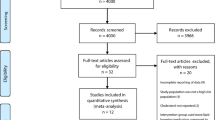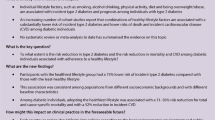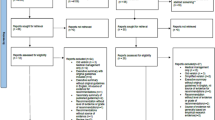Abstract
This systematic review aims to summarize the available randomized trials of multifactorial lifestyle interventions in the primary and secondary prevention of coronary heart disease and type 2 diabetes mellitus. Randomized trials investigating the effects of lifestyle interventions including the elements of diet, physical activity, and stress management in people at increased risk for or with manifest coronary heart disease or type 2 diabetes mellitus were searched for in five electronic database and by citation tracking. Quality was assessed using the Cochrane Collaboration’s risk of bias tool. Exploratory effect size calculations were performed for a variety of laboratory and clinical outcome measures. Twenty-five trials including a total of 7,703 participants met the inclusion criteria. Fifteen trials were in patients with coronary heart disease, seven in patients with type 2 diabetes mellitus, and three on primary prevention. The interventions varied greatly regarding concept, intensity, and providers. Compared to participants in “usual care” control groups, there were no consistent effects on lipid levels and blood pressure and small effects on body mass index and glycated hemoglobin (HbA1c). Composite cardiac event rates were significantly less in the intervention groups of the few trials reporting these outcomes. Mortality was also lower in the intervention groups, but the difference was not statistically significant, and confidence intervals were wide. The evidence base for multifactorial lifestyle interventions is weak. Effects on surrogate measures seem minor, but there may be clinically relevant effects on major clinical endpoints.





Similar content being viewed by others
References
Deshpande AD, Harris-Hayes M, Schootman M. Epidemiology of diabetes and diabetes-related complications. Phys Ther. 2008;88:1254-1264.
Kromhout D. Epidemiology of cardiovascular diseases in Europe. Public Health Nutr. 2001;4:441-457.
Yusuf S, Hawken S, Ounpuu S, et al. Effect of potentially modifiable risk factors associated with myocardial infarction in 52 countries (the INTERHEART study): Case-control study. Lancet. 2004;364:937-952.
Clark AM, Hartling L, Vandermeer B, McAlister FA. Meta-analysis: Secondary prevention programs for patients with coronary artery disease. Ann Intern Med. 2005;143:659-672.
Ketola E, Sipila R, Makela M. Effectiveness of individual lifestyle interventions in reducing cardiovascular disease and risk factors. Ann Med. 2000;32:239-251.
Orozco LJ, Buchleitner AM, Gimenez-Perez G, Roque IF, Richter B, Mauricio D. Exercise or exercise and diet for preventing type 2 diabetes mellitus. Cochrane Database Syst Rev. 2008;(3):CD003054.
Taylor RS, Brown A, Ebrahim S, et al. Exercise-based rehabilitation for patients with coronary heart disease: Systematic review and meta-analysis of randomized controlled trials. Am J Med. 2004;116:682-692.
Vitetta L, Anton B, Cortizo F, Sali A. Mind-body medicine: Stress and its impact on overall health and longevity. Ann NY Acad Sci. 2005;1057:492-505.
Higgins JPT, Altman DG. Chapter 8: Assessing the risk of bias in included studies. In: Higgins JPT, Green S, eds. Cochrane Handbook for Systematic Reviews of Interventions. The Cochrane Collaboration; 2008.
Aldana SG, Greenlaw R, Salberg A, Merrill RM, Hager R, Jorgensen RB. The effects of an intensive lifestyle modification program on carotid artery intima-media thickness: A randomized trial. Am J Health Promot. 2007;21:510-516.
Cooper H, Booth K, Gill G. Using combined research methods for exploring diabetes patient education. Patient Educ Couns. 2003;51:45-52.
Cooper HC, Booth K, Gill G. Patients' perspectives on diabetes health care education. Health Educ Res. 2003;18:191-206.
Edelman D, Oddone EZ, Liebowitz RS, et al. A multidimensional integrative medicine intervention to improve cardiovascular risk. J Gen Intern Med. 2006;21:728-734.
Elder C, Aickin M, Bauer V, Cairns J, Vuckovic N. Randomized trial of a whole-system ayurvedic protocol for type 2 diabetes. Altern Ther Health Medicine. 2006;12:24-30.
Giannuzzi P, Temporelli PT, Maggioni AP, et al. GlObal secondary prevention strategies to limit event recurrence after myocardial infarction: The GOSPEL study. A trial from the Italian Cardiac Rehabilitation Network: Rationale and design. Eur J Cardivasc Prev Rehabil. 2005;12:555-561.
Giannuzzi P, Temporelli PT, Marchioli R, et al. Global secondary prevention strategies to limit event recurrence after myocardial infarction: Results of the GOSPEL study, a multicenter, randomized controlled trial from the Italian Cardiac Rehabilitation Network. Arch Intern Med. 2008;168:2194-2204.
Gould KL, Ornish D, Kirkeeide R, et al. Improved stenosis geometry by quantitative coronary arteriography after vigorous risk factor modification. Am J Cardiol. 1992;69:845-853.
Gould KL, Ornish D, Scherwitz L, et al. Changes in myocardial perfusion abnormalities by positron emission tomography after long-term, intense risk factor modification. JAMA. 1995;274:894-901.
Hofman-Bang C, Lisspers J, Nordlander R, et al. Two-year results of a controlled study of residential rehabilitation for patients treated with percutaneous transluminal coronary angioplasty. A randomized study of a multifactorial programme. Eur Heart J. 1999;20:1465-1474.
Ko SH, Song KH, Kim SR, et al. Long-term effects of a structured intensive diabetes education programme (SIDEP) in patients with Type 2 diabetes mellitus—a 4-year follow-up study. Diabet Med. 2007;24:55-62.
Lisspers J, Sundin O, Hofman-Bang C, et al. Behavioral effects of a comprehensive, multifactorial program for lifestyle change after percutaneous transluminal coronary angioplasty: A prospective, randomized controlled study. J Psychosom Res. 1999;46:143-154.
Lisspers J, Sundin O, Ohman A, Hofman-Bang C, Rydén L, Nygren A. Long-term effects of lifestyle behavior change in coronary artery disease: Effects on recurrent coronary events after percutaneous coronary intervention. Health Psychol. 2005;24:41-48.
Manchanda SC, Narang R, Reddy KS, et al. Retardation of coronary atherosclerosis with yoga lifestyle intervention. J Assoc Physicians India. 2000;48:687-694.
Michalsen A, Grossman P, Lehmann N, et al. Psychological and quality-of-life outcomes from a comprehensive stress reduction and lifestyle program in patients with coronary artery disease: Results of a randomized trial. Psychother Psychosom. 2005;74:344-352.
Michalsen A, Knoblauch NT, Lehmann N, et al. Effects of lifestyle modification on the progression of coronary atherosclerosis, autonomic function, and angina—the role of GNB3 C825T polymorphism. Am Heart J. 2006;151:870-877.
Michalsen A, Lehmann N, Paul A, et al. Long-term effects of a one-year mind-body medicine program in patients with coronary artery disease: Final results of the randomized controlled SAFE-LIFE trial. Forsch Komplementärmed. 2007;14(suppl 1):18.
Nilsson PM, Klasson EB, Nyberg P. Life-style intervention at the worksite—reduction of cardiovascular risk factors in a randomized study. Scand J Work Environ Health. 2001;27:57-62.
Oldenburg B, Martin A, Greenwood J, Bernstein L, Allan R. A controlled trial of a behavioral and educational intervention following coronary artery bypass surgery. J Cardiopulm Rehab. 1995;15:39-46.
Ornish D, Brown SE, Scherwitz LW, et al. Can lifestyle changes reverse coronary heart disease? The Lifestyle Heart Trial. Lancet. 1990;336:129-133.
Ornish D, Scherwitz LW, Billings JH, et al. Intensive lifestyle changes for reversal of coronary heart disease. JAMA. 1998;280:2001-2007.
Ott CR, Sivarajan ES, Newton KM, et al. A controlled randomized study of early cardiac rehabilitation: The sickness impact profile as an assessment tool. Heart Lung. 1983;12:162-170.
P.RE.COR.Group. Comparison of a rehabilitation programme, a counselling programme and usual care after an acute myocardial infarction: Results of a long-term randomized trial. Eur Heart J. 1991;12:612-616.
Sebregts EH, Falger PR, Bär FW, Kester AD, Appels A. Cholesterol changes in coronary patients after a short behavior modification program. Int J Behav Med. 2003;10:315-330.
Sebregts EH, Falger PR, Appels A, Kester AD, Bär FW. Psychological effects of a short behavior modification program in patients with acute myocardial infarction or coronary artery bypass grafting. A randomized controlled trial. J Psychosom Res. 2005;58:417-424.
Shibayama T, Kobayashi K, Takano A, Kadowaki T, Kazuma K. Effectiveness of lifestyle counseling by certified expert nurse of Japan for non-insulin-treated diabetic outpatients: A 1-year randomized controlled trial. Diabetes Res Clin Prac. 2007;76:265-268.
Sivarajan ES, Bruce RA, Lindskog BD, Almes MJ, Belanger L, Green B. Treadmill test responses to an early exercise program after myocardial infarction: A randomized study. Circulation. 1982;65:1420-1428.
Sivarajan ES, Newton KM, Almes MJ. Limited effects of outpatient teaching and counseling after myocardial infarction: A controlled study. Heart Lung. 1983;12:65-73.
Sundin O, Lisspers J, Hofman-Bang C, Nygren A, Rydén L, Ohman A. Comparing multifactorial lifestyle interventions and stress management in coronary risk reduction. Int J Behav Med. 2003;10:191-204.
Toobert DJ, Glasgow RE, Nettekoven LA, Brown JE. Behavioral and psychosocial effects of intensive lifestyle management for women with coronary heart disease. Patient Educ Couns. 1998;35:177-188.
Toobert DJ, Glasgow RE, Radcliffe JL. Physiologic and related behavioral outcomes from the Women's Lifestyle Heart Trial. Ann Behav Med. 2000;22:1-9.
Toobert DJ, Glasgow RE, Strycker LA, et al. Biologic and quality-of-life outcomes from the Mediterranean Lifestyle Program: A randomized clinical trial. Diabetes Care. 2003;26:2288-2293.
Toobert DJ, Strycker LA, Glasgow RE, Barrera JM, Angell K. Effects of the mediterranean lifestyle program on multiple risk behaviors and psychosocial outcomes among women at risk for heart disease. Ann Behav Med. 2005;29:128-137.
Toobert DJ, Glasgow RE, Strycker LA, Barrera JM, Ritzwoller DP, Weidner G. Long-term effects of the Mediterranean lifestyle program: A randomized clinical trial for postmenopausal women with type 2 diabetes. Int J Behav Nutr Phys Act. 2007;4:1.
Vestfold Heartcare Study Group. Influence on lifestyle measures and five-year coronary risk by a comprehensive lifestyle intervention programme in patients with coronary heart disease. Eur J Cardiovas Preven Rehab. 2003;10:429-437.
Wattana C, Srisuphan W, Pothiban L, Upchurch SL. Effects of a diabetes self-management program on glycemic control, coronary heart disease risk, and quality of life among Thai patients with type 2 diabetes. Nurs Health Sci. 2007;9:135-141.
Wister A, Loewen N, Kennedy-Symonds H, McGowan B, McCoy B, Singer J. One-year follow-up of a therapeutic lifestyle intervention targeting cardiovascular disease risk. CMAJ. 2007;177:859-865.
Young RJ, Taylor J, Friede T, et al. Pro-active call center treatment support (PACCTS) to improve glucose control in type 2 diabetes: A randomized controlled trial. Diabetes Care. 2005;28:278-282.
Yu CM, Li LS, Ho HH, Lau CP. Long-term changes in exercise capacity, quality of life, body anthropometry, and lipid profiles after a cardiac rehabilitation program in obese patients with coronary heart disease. Am J Cardiol. 2003;91:321-325.
Yu CM, Lau CP, Chau J, et al. A short course of cardiac rehabilitation program is highly cost effective in improving long-term quality of life in patients with recent myocardial infarction or percutaneous coronary intervention. Arch Phys Med Rehabil. 2004;85:1915-1922.
Yu CM, Li LS, Lam MF, Siu DC, Miu RK, Lau CP. Effect of a cardiac rehabilitation program on left ventricular diastolic function and its relationship to exercise capacity in patients with coronary heart disease: Experience from a randomized, controlled study. Am Heart J. 2004;147:e24.
Sherwin R, Kaelber CT, Kezdi P, Kjelsberg MO, Thomas HE Jr. The multiple risk factor intervention trial (MRFIT) II. The development of the protocol. Prev Med. 1981;10:402-425.
Orchard TJ, Temprosa M, Goldberg R, et al. The effect of metformin and intensive lifestyle intervention on the metabolic syndrome: The Diabetes Prevention Program randomized trial. Ann Intern Med. 2005;142:611-619.
Conn VS, Valentine JC, Cooper HM. Interventions to increase physical activity among aging adults: A meta-analysis. Ann Behav Med. 2002;24:190-200.
Conn VS, Hafdahl AR, Moore SM, Nielsen PJ, Brown LM. Meta-analysis of interventions to increase physical activity among cardiac subjects. Int J Cardiol. 2009;133:307-320.
Conn VS, Hafdahl AR, Cooper PS, Brown LM, Lusk SL. Meta-analysis of workplace physical activity interventions. Am J Prev Med. 2009;37:330-339.
Conn VS, Hafdahl AR, Brown LM. Meta-analysis of quality-of-life outcomes from physical activity interventions. Nurs Res. 2009;58:175-183.
Franz MJ, VanWormer JJ, Crain AL, et al. Weight-loss outcomes: A systematic review and meta-analysis of weight-loss clinical trials with a minimum 1-year follow-up. J Am Diet Assoc. 2007;107:1755-67.
Dickinson HO, Mason JM, Nicolson DJ, et al. Lifestyle interventions to reduce raised blood pressure: A systematic review of randomized controlled trials. J Hypertens. 2006;24:215-233.
Harrington M, Gibson S, Cottrell RC. A review and meta-analysis of the effect of weight loss on all-cause mortality risk. Nutr Res Rev. 2009;22:93-108.
Noar SM, Benac CN, Harris MS. Does tailoring matter? Meta-analytic review of tailored print health behaviour change interventions. Psychol Bull. 2007;133:673-693.
Karmisholt K, Gøtzsche PC. Physical activity for secondary prevention of disease. Systematic reviews of randomised clinical trials. Dan Med Bull. 2005;52:90-94.
Boutron I, Moher D, Altman DG, Schulz KF, Ravaud P. Extending the CONSORT statement to randomized trials of nonpharmacologic treatment: Explanation and elaboration. Ann Intern Med. 2008;148:295-309.
Lorig KR, Ritter PL, Laurent DD, Plant K. Internet-based chronic disease self-management. A randomized trial. Med Care. 2006;44:964-971.
Acknowledgment
No other persons have made substantial contributions to this manuscript.
Funding
This work was supported by a grant of the German Ministry of Education and Research (01KG0614). The ministry had no role in the design and conduct of the study; collection, management, analysis, and interpretation of the data; and preparation, review, or approval of the manuscript.
Conflict of interest
None
Author information
Authors and Affiliations
Corresponding author
Electronic Supplementary Material
Below is the link to the electronic supplementary material.
Web Table 1
Behavior change (DOC 55 kb)
Web Table 2
Components of lifestyle interventions (DOC 65 kb)
Web Table 3
Search strategy, July 2007 (DOC 136 kb)
About this article
Cite this article
Angermayr, L., Melchart, D. & Linde, K. Multifactorial Lifestyle Interventions in the Primary and Secondary Prevention of Cardiovascular Disease and Type 2 Diabetes Mellitus—A Systematic Review of Randomized Controlled Trials. ann. behav. med. 40, 49–64 (2010). https://doi.org/10.1007/s12160-010-9206-4
Published:
Issue Date:
DOI: https://doi.org/10.1007/s12160-010-9206-4




